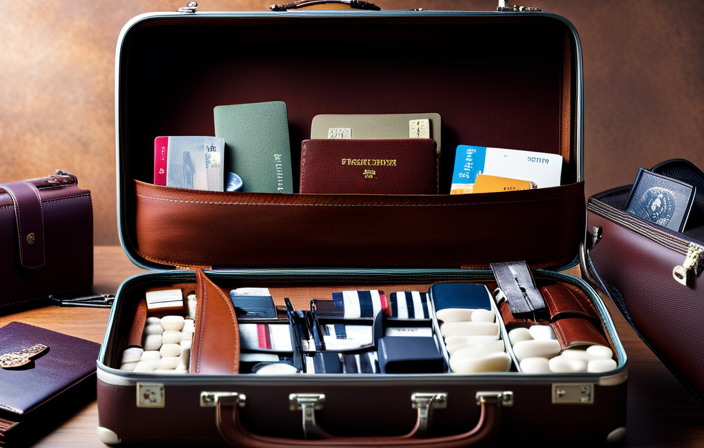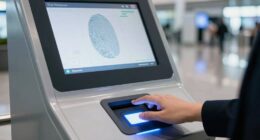Taking prescription medications with you on your travels might appear to be difficult, but it really isn’t. Did you know that you are allowed to carry prescription medicines, including liquids, on aircraft?
As someone who travels frequently with prescription medications, I’ve learned a few essential tips for a smooth trip. From understanding airline policies to organizing and storing medications, I’ll share everything you need to know.
So, let’s dive in and ensure your next flight is hassle-free when it comes to your important medications.
Key Takeaways
- Carry prescription medications in your carry-on luggage to ensure access during emergencies and prevent separation from your medications.
- Store medications in pill organizers instead of original bottles, but carry a doctor’s note or proof of prescription for verification.
- Avoid packing medications in checked baggage to prevent loss or damage, as well as potential unavailability at your destination.
- Maintain a respectful attitude and cooperate with TSA agents, explaining your prescription medications calmly to facilitate the screening process.
Understanding Airline Policies on Prescription Medications
I always make sure to understand the airline policies on prescription medications before my flight.
When traveling with prescription medications, it is important to be aware of international regulations. Most airlines allow passengers to bring prescription medications, including liquids, on board. It is advisable to carry a doctor’s note or proof of prescription to avoid any issues during security screenings.
When it comes to storing prescription medications while traveling, it is recommended to keep them in a pill organizer instead of their original bottles. This helps save space and makes it easier to manage your medications.
Additionally, it is crucial to keep important medications in your carry-on luggage, as flight delays or lost baggage can separate you from your medications. Avoid packing medications in checked baggage to prevent loss or damage.
Organizing and Storing Medications for Travel
Carrying medications in pill organizers, rather than original bottles, can help keep them organized and easily accessible during travel.
When packing medications securely for a trip, it is important to communicate with healthcare providers. They can provide guidance on how to properly store and transport your medications. It is advisable to carry a doctor’s note or proof of prescription, as it can help avoid any issues during security screenings.
Additionally, always keep important medications in your carry-on luggage to prevent loss or damage. In case of flight delays, layovers, or lost baggage, having medications in your carry-on ensures access during emergencies. Remember, some medications may not be readily available at your destination, so it is essential to prioritize carrying your medications over other items.
Importance of Carrying Medications in Carry-On Luggage
Having medications in my carry-on luggage ensures that I can access them during emergencies.
When organizing medications for travel, it is important to remember that prescription medications, including liquids, are allowed on flights. They can be stored in pill organizers, not necessarily in their original bottles. However, it is advisable to carry a doctor’s note or proof of prescription to avoid any issues with TSA agents.
Communicating with TSA agents is crucial in facilitating the screening process. Kindness and cooperation go a long way in ensuring a smoother airport experience. Explaining your prescription medications calmly and inquiring about any specific policies can help avoid misunderstandings.
Navigating Security Screenings With Prescription Medications
Navigating security screenings with prescription medications can be made easier by communicating calmly with TSA agents and inquiring about any specific policies. Here are some tips for communicating with TSA agents and my experiences with prescription medications on planes:
-
Be prepared: Have your medications easily accessible and be ready to explain their purpose and dosage.
-
Carry documentation: Carry a doctor’s note or proof of your prescription to avoid any misunderstandings.
-
Stay calm: Remain calm and patient during the screening process. TSA agents are there to ensure everyone’s safety.
-
Ask questions: If you have any concerns or questions about the screening process, don’t hesitate to ask the TSA agents for clarification.
-
Share past experiences: If you have encountered any difficulties or misunderstandings in the past, share them with the agents to help improve the process.
Common Issues and Challenges With Flying and Medications
Dealing with security screenings and potential misunderstandings can be a challenge when traveling with my necessary medications. One common issue is the possibility of medication shortages, which can be especially worrisome when traveling to remote or less developed areas.
To handle this, it is important to plan ahead and carry extra medication in case of emergencies. Another strategy is to research local pharmacies at your destination and have a backup plan in case you need to refill your prescription.
In case of medication emergencies, it is crucial to have a written list of all your medications, including dosage and frequency, as well as contact information for your healthcare provider. This will help healthcare professionals provide you with the necessary care and ensure continuity of treatment.
It’s always better to be prepared and have a plan in place for any medication-related emergencies while traveling.
Tips for Smoothly Traveling With Prescription Medications
Now that we’ve discussed the common issues and challenges when flying with medications, let’s move on to some essential tips for smoothly traveling with prescription medications.
Packing medications properly is crucial to ensure their safety and accessibility during your trip. First, make sure to pack all important medications in your carry-on luggage to avoid any potential loss or damage. Additionally, it is recommended to keep medications in their original bottles or pill organizers, and to carry a doctor’s note or proof of prescription.
In case of a medication emergency, it’s important to be prepared. Always carry extra doses of your medications in case of unforeseen delays or lost baggage. If you have any concerns or questions about medication policies, don’t hesitate to inquire with TSA or the airline.
Lastly, if you encounter any issues during the security screening, remain calm and explain the situation politely. By following these tips, you can ensure a smoother and stress-free travel experience with your prescription medications.
Essential Reminders for a Hassle-Free Trip With Medications
Remembering to pack all necessary medications in your carry-on is crucial for a hassle-free trip. When it comes to packing medication, there are a few tips to keep in mind.
First, make sure to pack all medications in their original bottles or pill organizers. This will help with identification and dosage instructions.
Additionally, it’s a good idea to carry a doctor’s note or proof of prescription to avoid any issues at security checkpoints.
Ensuring access to medications during emergencies is also important. Flight delays, layovers, or lost baggage can separate you from your medications, so having them in your carry-on ensures that you have access when you need it most.
Frequently Asked Questions
Are There Any Restrictions on the Quantity of Prescription Medications That Can Be Carried in Carry-On Luggage?
There are quantity restrictions on prescription medications when traveling with controlled substances. It is important to know the specific rules and regulations of the airline and TSA to ensure a smooth trip.
Can I Bring Over-The-Counter Medications in My Carry-On Bag?
Yes, you can bring over-the-counter medications in your carry-on bag. However, it’s important to follow regulations regarding liquid medications and check the TSA guidelines for any restrictions or additional requirements.
Do I Need to Declare My Prescription Medications to TSA Agents During the Security Screening Process?
Yes, it is necessary to declare prescription medications to TSA agents during the security screening process. There may be restrictions on the quantity of medications, but they can be carried in carry-on luggage. It is important to follow the guidelines for carrying liquid medications. I have encountered problems with TSA agents before, but explaining calmly and cooperating with them helps. It is crucial to have a smooth trip when flying with prescription medications.
What Should I Do if I Encounter a Problem or Misunderstanding With TSA Agents Regarding My Prescription Medications?
If I encounter a problem or misunderstanding with TSA agents regarding my prescription medications, I would handle the dispute by calmly communicating with them, explaining the situation, and seeking clarification on their policies.
Are There Any Specific Guidelines or Regulations for Carrying Liquid Medications on Flights?
Yes, there are specific guidelines for carrying liquid medications on flights. It is important to store prescription medications properly and carry them in your carry-on luggage for easy access and to prevent loss or damage.










